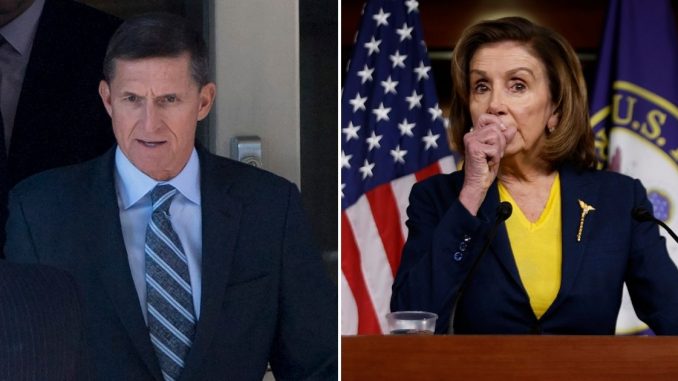
Gen. Michael Flynn has filed a complaint to stop a subpoena from the House Select Committee to Investigate the January 6th Attack on the United States Capitol. He also filed a motion for a temporary restraining order and preliminary injunction specifically against Speaker of the House Nancy Pelosi.
The filed complaint named all nine members of the Select Committee as defendants; the filed motion named Pelosi as the single defendant.
Flynn served under former President Donald Trump for only a few weeks at the beginning of the administration, resigning on Feb. 13, 2017. But the House committee looking into the events of Jan. 6 have unexpectedly focused on Flynn in their investigation.
In November, Flynn was mailed a subpoena ordering him to hand over documents and appear for a deposition.
“The Subpoena commanded General Flynn produce documents in response to twenty sweeping and vague demands covering a year and a half time frame — by November 23, 2021. Further, it commanded General Flynn to appear for a deposition on December 6, 2021, ” the complaint read.
The complaint explained that at the time of Jan. 6, (and during all the times relevant to the subpoena and committee investigation) Gen. Flynn was a private citizen who personally held doubts and beliefs about the integrity of the 2020 election — but that is no crime, the complaint argued.
“It is not a crime to hold such beliefs, regardless of whether they are correct or mistaken, to discuss them with others, to associate with those who share the same belief, or to ask the government to address such political concerns,” the filing read.
Flynn raised concerns over the subpoena. But the committee “stubbornly refused to provide any clarification or cooperation to resolve these issues,” the complaint read.
The complaint stated that the committee has been rushing to refer any non-cooperative witnesses to criminal prosecution by the Department of Justice for contempt of Congress.
“Thus, General Flynn is caught between alternatives that both risk criminal prosecution by the Department of Justice, either in an ongoing criminal probe, or in a new prosecution for contempt of Congress,” the filing read.
Overall, the complaint questioned the legality of the subpoena issued to Flynn.
Flynn’s complaint seeks declaratory and injunctive relief from the House committee, which would stop the enforcement of the subpoena.
See the filed complaint and filed motion below.
Separately, Flynn also filed a motion naming Speaker of the House Pelosi alone as the defendant seeking a temporary restraining order and preliminary injunction. The motion argued that Flynn had no part in organizing, speaking at or participating in the rallies, protest or incursion that took place on Jan. 6 and that the subpoena is furthermore an assault on Flynn’s constitutional rights.
“The subpoena demands records of General Flynn’s communications about the 2020 election, and seeks to identify the basis for his beliefs and the persons with whom he associated, in addition to contacts with government officials. It thus constitutes a frontal assault on his 1st Amendment rights to freedom of speech, association, and petition,” the motion read.
It also argued that the subpoena would violate his 5th Amendments rights since “the documents and testimony seek to subvert General Flynn’s 5th Amendment right against compelled self-incrimination.”
The motion also argued that the committee’s very issuing of the subpoena was faulty. It violated the committee’s own authorizing resolution, was overly vague, and was “not issued for a valid legislative purpose, but rather the partisan harassment of a person because he holds political views the Select Committee dislikes.”
The temporary restraining order, if granted, would relieve Flynn from appearing for a deposition or producing records. It would also prohibit Pelosi from enforcing the challenged subpoenas or from using any records it may have obtained.
Flynn’s motion then requested that if the temporary restraining order is granted, then it should be converted into a preliminary injunction following any necessary briefing or hearing. This would then prevent Pelosi and the select committee from enforcing the subpoenas, essentially cutting off the investigation into Flynn.
